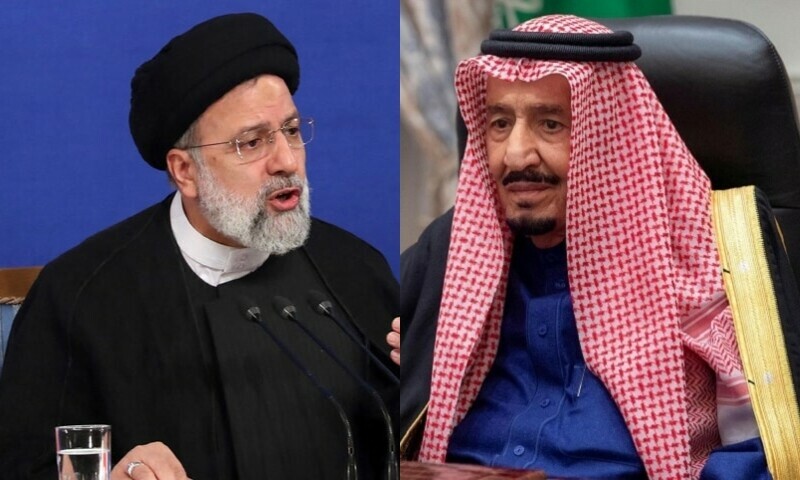
-
Published: 19 March 2023

An Iranian official announced on Sunday that President Ebrahim Raisi had received an invitation from Saudi King Salman bin Abdulaziz to visit the Kingdom, following the reconciliation agreement between the two countries.
Edited by | Tony Wild
World section -CJ journalist
03/19/2023 - 10:21:11 PM
Muhammad Jamshidi, a political aide to the Iranian president, said in a tweet on Twitter, "In his message that he sent to President Raisi, the Saudi monarch welcomed the agreement between the two brotherly countries and invited him to Riyadh, and Raisi welcomed the invitation."
The Saudi government communications office did not immediately respond to requests for comment on the story. The Saudi official media did not publish the message.
Iran had informed Saudi Arabia of its readiness to hold a meeting between the foreign ministers of the two countries in the wake of the agreement to resume diplomatic relations between them, according to Iranian Foreign Minister Hossein Amir Abdullahian today, Sunday.
Abdullahian said, in a press conference held at the end of the Iranian year, that he would meet his Saudi counterpart, Faisal bin Farhan, "in the near future." He was quoted by the Iranian Tasnim news agency as saying: "During the past ten days, we exchanged messages through Switzerland, and one of those messages announced Iran's readiness to attend a meeting of foreign ministers and proposed three places for that meeting."
On March 10, Saudi Arabia and Iran surprisingly announced their agreement to resume diplomatic relations after many years of estrangement, with China playing the role of host, mediator, and one of the signatories to their joint statement.
Diplomatic relations between the two countries were severed in 2016 after the Saudi diplomatic headquarters in Iran was attacked by Iranian protesters, after the Saudi authorities executed the Saudi Shiite cleric Nimr al-Nimr.
And according to what was reported by the official news agency in Saudi Arabia, it was agreed that the Saudi and Iranian foreign ministers would hold a meeting to activate this, arrange the exchange of ambassadors and discuss ways to strengthen relations between the two countries.
It is expected that the agreement between Iran and Saudi Arabia will lead to the reopening of embassies and diplomatic missions within two months and the implementation of security and economic cooperation agreements signed between them more than 20 years ago.
Speaking during the press conference about the manner in which the agreement was reached, Abdullahian indicated that Tehran and Riyadh participated in five rounds of talks in the Iraqi capital, Baghdad, and three rounds in the Omani capital, Muscat.
The Iranian minister said: "Then the Chinese president took the decision to put forward an initiative to push this process forward, which resulted in the result that you know."
The announcement of the agreement raised a lot of speculation about its extent and whether it represents a real breakthrough in relations between the two countries, given that the joint statement issued on March 10 did not include sufficient details on any of the contentious regional issues between them.
Among these contentious issues is the conflict in Yemen, where Saudi Arabia continues to confront the Houthi movement backed by Iran.
Commenting on this issue, Abdollahian said that the issues discussed by the Iranian and Saudi delegations in Beijing "are included in the statement."
"We consider Yemen a matter of the Yemeni people. Of course, the focus on peace in the region was part of the agreements concluded between Iran and Riyadh," the Iranian minister added.
The Wall Street Journal quoted US and Saudi officials as saying that Iran had agreed to stop secret arms shipments to the Houthis under the China-brokered deal.
Iran and Saudi Arabia compete for influence in Iraq, Syria, and Lebanon.
Other Gulf countries followed Saudi Arabia's lead in downgrading its diplomatic representation in Tehran in 2016, but the UAE and Kuwait have recently restored relations with Iran.
Iran said last week it would welcome the resumption of relations with Bahrain following the deal with Saudi Arabia.
Bahrain had previously accused Iran of training and supporting Shiite dissidents to overthrow the Sunni-led government in Manama. But Tehran denies this.
Last September, Iran welcomed the Emirati ambassador after an absence of six years and said a month earlier that Kuwait had sent its first ambassador to Tehran since 2016.
Ali Shamkhani, a senior Iranian security official, held talks Thursday with UAE President Mohammed bin Zayed Al Nahyan in Abu Dhabi, in another sign of changing relations in the region, according to Agence France-Presse.
